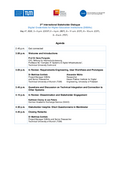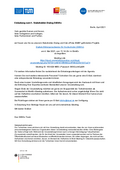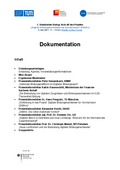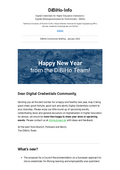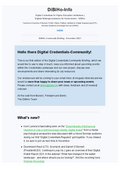9th edition: Digital Credentials Regulars
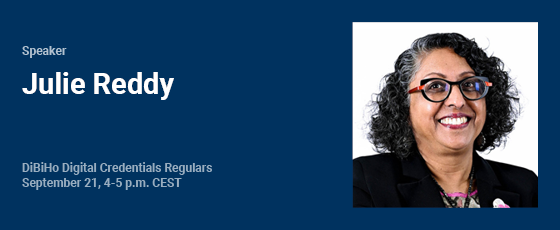
Please join us at our Digital Credentials Regulars get-together at our virtual pub on Wednesday, September 21st from 4:00-5:00 p.m. CEST.
Dr Julie Reddy will be spotlighting the South African approach to digital credentialing and share her methodology and recommendations for the recognition of international qualifications and part-qualifications in her role as CEO of the South African Qualifications Authority (SAQA).
Julie is currently the Chief Executive Officer of the South African Qualifications Authority (SAQA). She has held senior management positions in SAQA since October 2012. Prior to that, she held senior management and leadership positions for over 30 years in the international and South African educational and skills development sectors, including as the founding CEO of the Chemical Industries Education and Training Authority and CEO of the Sector Education and Training Authority for Secondary Agriculture, and as Country Director/Chief of Party of the USA based international Advancing Basic Education ald Literacy Project. Dr Reddy is currently a member of the three South African Quality Councils: the Council on Higher; the Quality Council for Trades and Occupations; and Umalusi, the QC for General and Further Education and Training. She is also a member of the National Skills Authority and the Human Resources Development Council. Internationally, Dr Reddy is a member on the GDN Board of Directors and a UNESCO-UIL appointed International Juror for its Learning Cities Award. Her academic qualifications include both a MSc as a Fulbright Scholar, and a PhD from Cornell University in the USA.
The event will take place in English. It will also be possible to have individual conversations in smaller groups at the bar or piano lounge.
If you are interested in attending, please let us know at dibiho@daad.de.
Moving Target Digitalisation 2022- Digital Credentials and Trust Networks

Moving Target Digitalisation 2022: Increasing the Impact of Internationalisation in Higher Education
Dear Digital Credentials Community,
For the second day in a row, we would like to share some news with you, this time on our own behalf. The Call for Participation of our joint conference "Moving Target Digitalisation 2022" is now open for contributions. This year’s Conference has a dedicated Digital Credentials and Trust Networks track organised by DiBiHo. We would be pleased if you would contribute to the conference programme and spread the call.
From November 30th to December 2nd, 2022, the #movingtarget2022 conference will take place in Berlin and online, focusing on the
impact of digitalisation and new technologies on the internationalisation of higher education.
The Call for Participation is now open! You can submit your contribution until August 7th, 2022.
You can find the CfP and the web form here: Call for Participation
Digitalisation is fundamentally changing international higher education. Collaboration across borders and new forms of mobility offer a
multitude of potentials in a globally networked world.
The DAAD conference "Moving Target Digitalisation" will address key issues in this context. With its focus on the latest developments in the internationalisation of higher education, it offers space for policy dialogue and facilitates exchange with expert communities in order to examine neighbouring initiatives and projects at home and abroad and discuss international cooperation and integration
opportunities.
The thematic-modular concept of the conference is oriented along the entire "student journey" and takes up the discussion on the
effects of digitalisation on the internationalisation of higher education and on academic exchange in four thematic tracks:
- Linking Digital Education Services – organised by BIRD and Digital Campus
- Virtual Exchange and Blended Mobility - organised by the Community Team of Digital Programmes (IMKD, IP Digital, IVAC)
- European Strategies for Digital Education - organised by OpenU
- Digital Credentials and Trust Networks - organised by DiBiHo
We are looking forward to (re-)thinking global exchange together with you!
Further information
Call for Participation – Website: Moving Target Digitalisation 2022 - DAAD – Contact: movingtarget@daad.de
8th edition: Digital Credentials Regulars
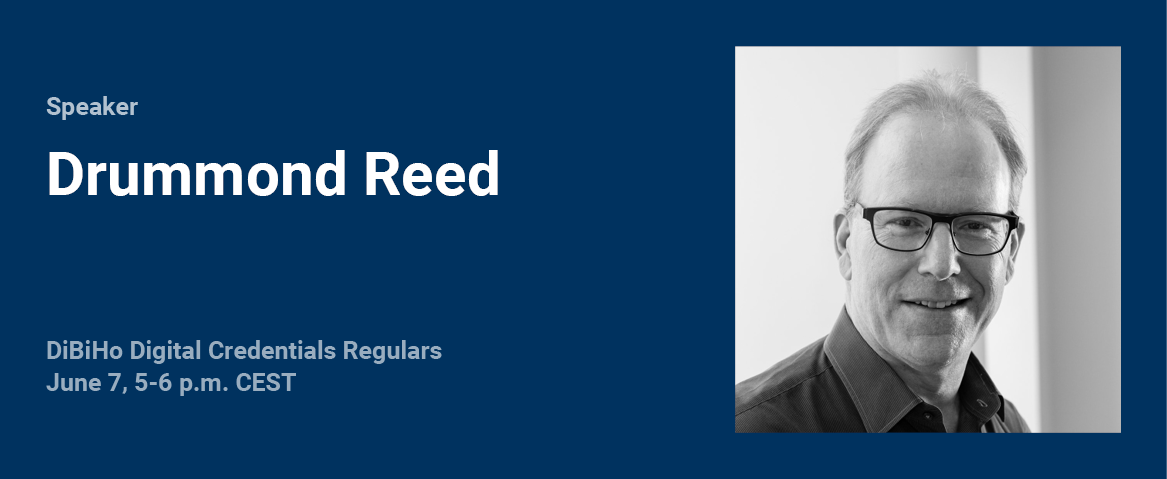
Please join us at our next Digital Credentials Regulars get-together with Drummond Reed at our virtual pub “The Self-Sovereign” on June 7th from 5 - 6 p.m. CEST.
Drummond will be sharing his analysis on the updated EU Digital Identity Architecture and Reference framework: eIDAS 2.0, offering his perspective on problems and opportunities as well as implications for future EU-US cooperation. We look forward to chatting with Drummond about his transformative work on self-sovereign identity and trust and are curious to hear his opinion on current discussions around unique and persistent identifiers, enhanced wallets, trust architectures and the role of the private sector in the field of digital identity.
Drummond Reed has spent a quarter-century in Internet identity, security, privacy, and trust infrastructure. He is Director, Trust Services at Avast after their acquisition of Evernym, where he was Chief Trust Officer. He is co-author of the book, Self-Sovereign Identity (Manning Publications, 2021), and co-editor of the W3C Decentralized Identifiers (DID) 1.0 specification. At the Trust over IP Foundation, Drummond is a member of the Steering Committee and co-chair of the Governance Stack Working Group and the Concepts and Terminology Working Group. At the Sovrin Foundation, he served as co-chair of the Sovrin Governance Framework Working Group for five years. From 2005-2015 he was co-chair of the OASIS XDI Technical Committee, a semantic data interchange protocol that implements Privacy by Design. Drummond also served as Executive Director for two industry foundations: the Information Card Foundation and the Open Identity Exchange, and as a founding board member of the OpenID Foundation, ISTPA, XDI.org, and Identity Commons. In 2002 he received the Digital Identity Pioneer Award from Digital ID World, and in 2013 he was cited as an OASIS Distinguished Contributor.
The event will take place in English. It will also be possible to have individual conversations in smaller groups at the bar or piano lounge.
If you are interested in attending, please let us know at dibiho@daad.de
7th edition: Digital Credentials Regulars
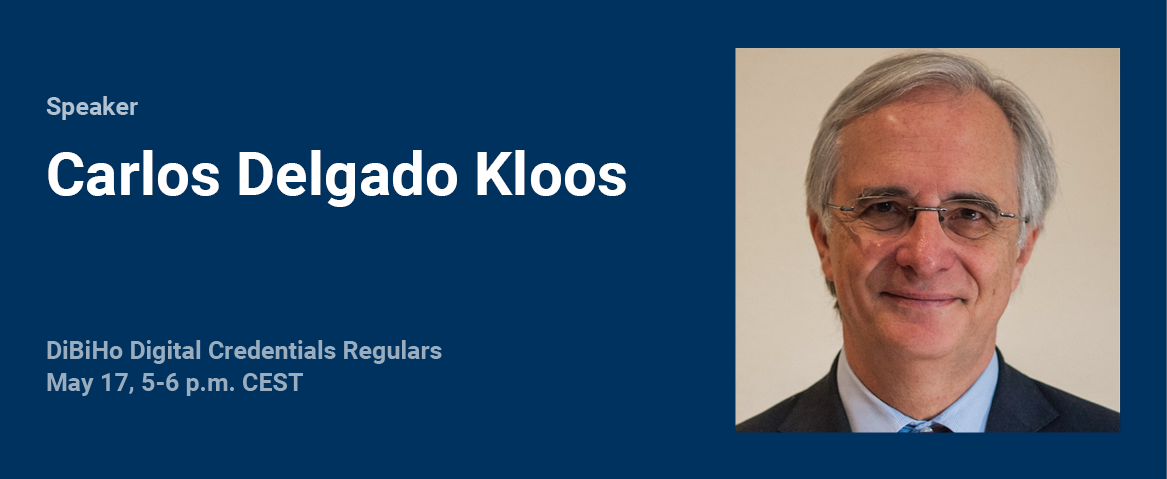
Please join us at our Digital Credentials Regulars get-together at our virtual pub on Tuesday, May 17th from 5:00-6:00 p.m. CEST.
Prof. Dr. Carlos Delgado Kloos will be spotlighting current developments in the field of digital credentials in Spain. CertiDigital is a new initiative of the UniDigital Plan of the Ministry of Universities to deploy a digital certification service for the Spanish university system. What was the rationale for its formation at this point in time? Which challenges are to be met and which opportunities for co-operation exist?
Carlos Delgado Kloos received the Ph.D. degree in Computer Science from the Technische Universität München and in Telecommunications Engineering from the Universidad Politécnica de Madrid. He is Full Professor of Telematics Engineering at the Universidad Carlos III de Madrid, where he is the Director of the GAST research group, Director of the UNESCO Chair on “Scalable Digital Education for All”, and Vice President for Strategy and Digital Education. He is also the Coordinator of the eMadrid research network on Educational Technology in the Region of Madrid. He is Senior Member of IEEE. He has been the Manager of ICT research projects at the Spanish Ministry and has carried out research stays at several universities such as Harvard, MIT, Munich, and Passau.
His main research interests are in Educational Technology. He has been involved in a large number of projects with European, bilateral, national, and regional funding. He has published around 500 articles in national and international conferences and journals and has further written a book and co-edited over a dozen. He has coordinated several MOOCs (on edX and MiríadaX) and is presently promoting the adoption of digital micro-credentials in Spain through the project CertiDigital.
The event will take place in English. It will also be possible to have individual conversations in smaller groups at the bar or piano lounge.
If you are interested in attending, please let us know at dibiho@daad.de.
2nd International Stakeholder Dialogue
One year ago, the kick-off meeting for the research project "Digital Credentials for Higher Education Institutions" (DiBiHo) took place, we would now like to take the time to update you on the project status and our findings.
We would be delighted if you could join us at our second international stakeholder dialogue on Wednesday, May 4th 2022, 3 – 5 p.m. CEST (Show in your time zone).
We are looking forward to sharing our requirements analysis, user workflows and prototypes, as well as discussing architecture decisions and obtaining feedback on our results so far.
For further information, please find the meeting agenda for download below .
If you would like to take part, please register your attendance here: Register here .
6th edition: Digital Credentials Regulars
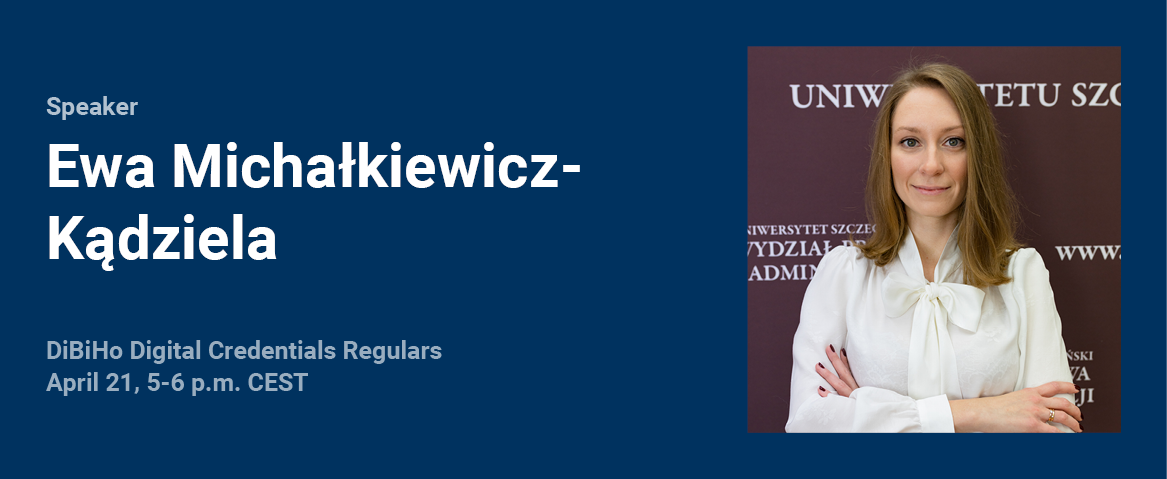
We look forward to welcoming you to our Digital Credentials Regulars get-together at our virtual pub on Thursday, April 21st from 5-6 p.m. CEST.
Dr. Ewa Michałkiewicz-Kądziela will be presenting findings from her recently published paper “Legal boundaries of digital identity creation”. We will have an hour’s time to chat about defining human identity in the digital world, the necessary legal tools for its implementation and the relationship between digital and real identity. What is the standard-setting role of the law in protecting the individual’s fundamental right to identity in the digital age? How does the digital environment affect human identity creation in a legal sense?
Ewa Michałkiewicz-Kądziela is Assistant Professor at the Faculty of Law and Administration, University Szczecin, Poland; she obtained a doctorate in law in 2019 after defending her doctoral dissertation entitled "The right to human identity in Polish and international law".
Her main area of research is human rights and their protection in the system of national, EU and international law. Among her research interests, a special place is occupied by the issues of human identity and the rights associated with it, as well as contemporary threats to human rights resulting from social, economic and technological changes. She conducts didactic classes in the following fields: Law, Administration, Medical Law, Law of Uniformed Services, where she performs, inter alia, such subjects as: constitutional law, European Union law, protection of human rights, states of emergency, sources of law, public interest ombudsmen in health protection.
She is the Rector's Plenipotentiary for International Cooperation and Coordinator of the Faculty Team for International Cooperation, a Member of the Dean's Council at the Faculty of Law and Administration of the University Szczecin and a Member of the Teams for Education Quality, Course Development and Postgraduate Development.
The event will take place in English. It will also be possible to have individual conversations in smaller groups at the bar or piano lounge.
If you are interested in attending, please let us know at dibiho@daad.de.
5th edition: Digital Credentials Regulars
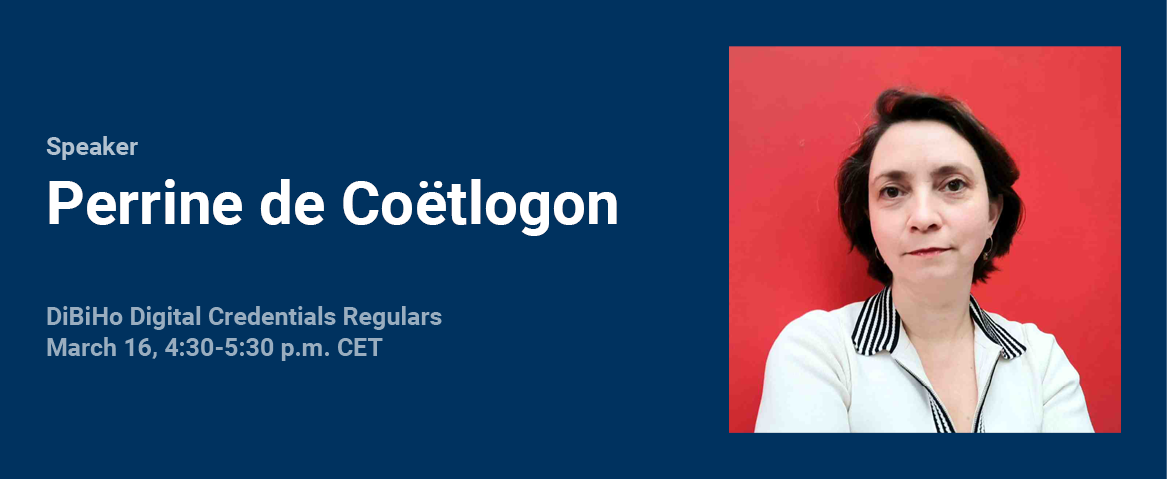
Join us at this month’s Digital Credentials Regulars at our virtual pub on March 16th from 4:30-5:30 p.m. CET.
Perrine de Coëtlogon will be sharing her thoughts on data exchange between countries reporting on the diploma and notarisation use case of the European Blockchain Service Infrastructure (EBSI) and achievements within advanced authentication to date. The recently published White Paper “Blockchain Technologies for the Public Sector” examines various use cases ranging from farming, notarisation and verifiable diplomas and considers possible practical uses of blockchain to improve general public service. We look forward to Perrine’s past experience on issuing over 20.000 verifiable credentials at the University of Lille, her views on the distribution of power in a centralised administration and what this means from a technological perspective as well as opening up the debate to topics such as migration.
Perrine de Coëtlogon is a civil servant of the University of Lille, France, at the Directorate for Pedagogical Innovation where she works in particular for Blockchain & Open Education. It was in 2017 that Perrine began hosting a national working group on Blockchain technologies in an educational context. With her colleagues and thanks to the work done by international networks, she has led her university’s digital transformation of the way the university issues and students share their “diploma” with 20 000 verifiable credentials issued in the blockchain Avalanche in 2021. In 2022, the objective is to issue in the European Blockchain Service Infrastructure (EBSI) and to offer any student the possibility to open their first wallet. She is also part of the DIAL4U, an Erasmus + project aiming to recognise the competences in teaching and learning foreign languages with open badges.
After French-German law studies, Perrine practised 7 years as a lawyer in Merger & Acquisitions at the Paris Bar. She then moved to Lille with her family in 2009 and became the General Secretary of the French Virtual University for Health and Sport Sciences. From 2015 to 2018, she was the “Digital Expert for Higher Education, Europe and International” at the French Ministry for Higher Education and Research, part of the European Working Group for Digital Skills and Competences. Passionate about Open Education and Open Educational Resources, she was elected member of the board of Open Education Global in 2020, where she launched Open Education Global Francophone. Perrine represents the French government in the European Blockchain Partnership (policy group).
The event will take place in English. It will also be possible to have individual conversations in smaller groups at the bar or piano lounge.
If you are interested in attending, please let us know at dibiho@daad.de.
4th edition: Digital Credentials Regulars
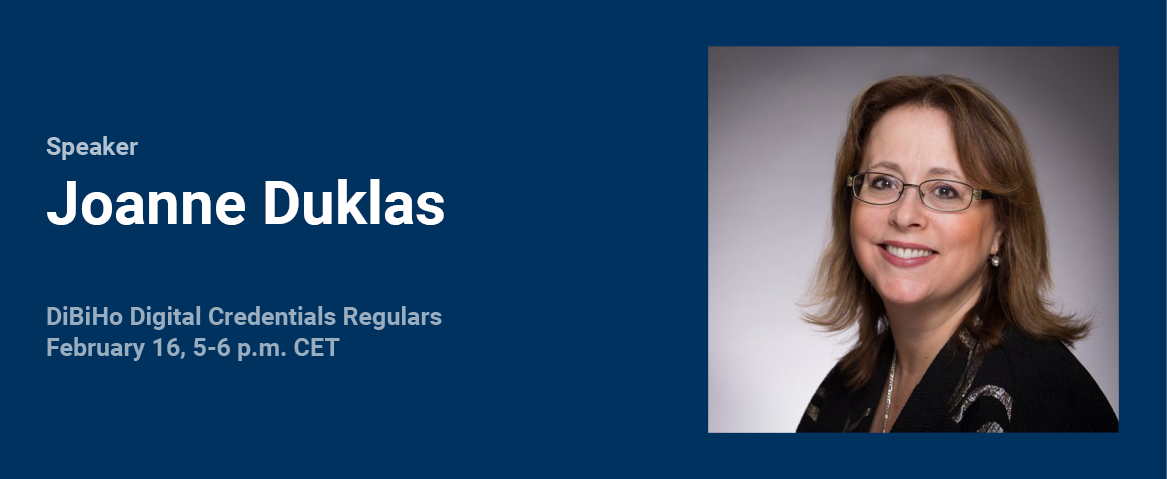
Please join us at our Digital Credentials Regulars get-together at our virtual pub “The Self-Sovereign” on February 16th from 5:00-6:00 p.m. CET.
We will be chatting with Joanne Duklas about her extensive experience in the digital credentials field, gained not only as a registrar, but also during her involvement as executive lead in the creation of the MyCreds / Mes Certifs National Network and credential wallet. This national document exchange highway and credential wallet for learners is owned by the Association of Registrars of the Universities and Colleges of Canada (ARUCC) and delivers digitised badges, micro-credentials, documents, transcripts and diplomas on behalf of Canadian colleges and universities. Joanne will be offering her view on running technology solutions and the challenges involved with a view to international data exchange and regulatory contexts.
Joanne Duklas is an award-winning researcher and consultant in higher education with several years experience in Canadian post-secondary education. Her career includes serving in various senior leadership roles within the post-secondary sector on stakeholder boards and at one of Canada’s largest institutions as a registrar and assistant vice president. Her scholarship research interests focus on student success and mobility.
A former president of the national registrars’ association (ARUCC, 2012), Joanne actively supports post-secondary organizations and government by leading large-scale projects, evidenced-based research, and cross-sector consultations to advance best practice and student success. She provides her institutional clients with expertise in a broad range of areas including pathway development, strategic and organizational reviews, service improvements, and policy development and standards creation.
Joanne has led and authored several national studies including creating Canada’s first national transcript and transfer guide and peer-reviewed national studies including International Transfer Credit Practices (2019) and Micro-Credentials: Trends in Credit Transfer and Credentialing (2020).
In her downtime, Joanne is a fine artist and exhibits her work in juried art shows when she’s not enjoying work or family. Visit her website to see more!
The event will take place in English. It will also be possible to have individual conversations in smaller groups at the bar or piano lounge.
If you are interested in attending, please let us know at dibiho@daad.de
3rd edition: Digital Credentials Regulars
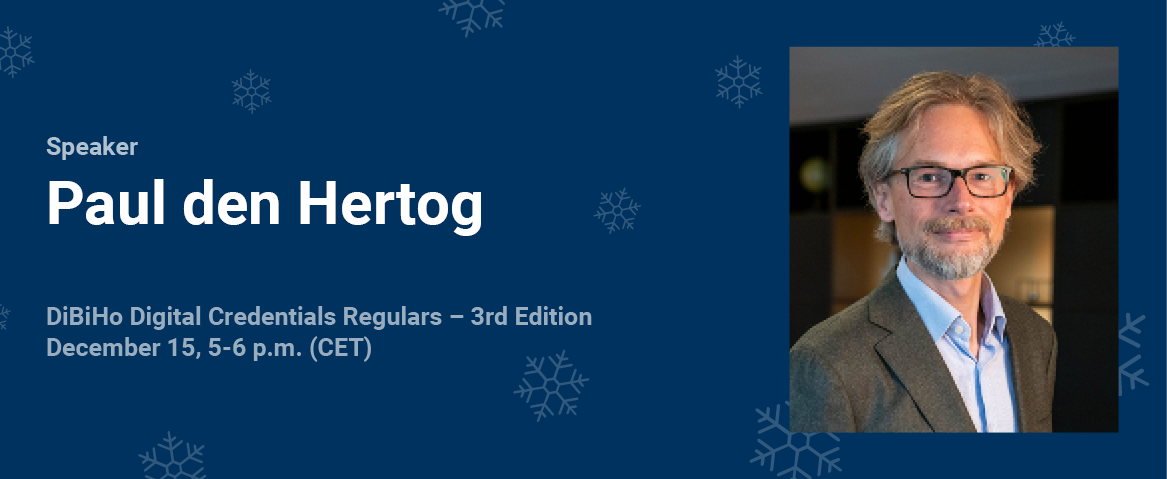
Do join us at our third Digital Credentials Regulars get-together at our virtual pub “The Self-Sovereign” on December 15th from 5:00-6:00 p.m. CET.
Paul den Hertog will be spotlighting the Netherlands and current developments in the field of digital credentials. The Dutch Acceleration Plan, and a pilot on micro-credentialing in Dutch HE driven by central databases and corresponding networks of educational institutions have made great advances in the field. Which challenges have been met or are yet to come and which findings can be transferred to the situation in other countries?
Paul den Hertog has worked for over 20 years at the Amsterdam University of Applied Sciences as an innovator and policy advisor. In these roles he was responsible for managing various innovation projects such as a campus wide web lecture service, ePortfolio and DLE-vision, -procurement and -implementation. Over the last three years Paul has worked as a policy advisor for the Board, and as captain of the Dutch Acceleration Plan, working on flexible education and lifelong learning. Recently Paul accepted a new role as advisor at SURF, the national cooperation for technology in public HE.
The event will take place in English. It will also be possible to have individual conversations in smaller groups at the bar or piano lounge.
Make sure to register now for a festive surprise. If you are interested in attending, please let us know at dibiho@daad.de
2nd edition: Digital Credentials Regulars
It would be great to welcome you to to our second Digital Credentials Regulars get-together at our virtual pub “The Self-Sovereign” on November 17th from 5:30-6:30 p.m. CET.
Thomas Kaiser will be sharing insights gained as the Managing Director of the Academic Evaluation Center at the German Embassy in Beijing as well as his current endeavours for India. We’ll have an hour to chat about the challenges involved in the verification of over 120.000 documents and what role digital credentials could play.
The event will take place in English or German depending on the audience. It will also be possible to have individual conversations in smaller groups at the bar or piano lounge.
If you are interested in attending, please let us know at dibiho@daad.de.
Review UFF Workshop
Self-Sovereign Identity in Higher Education: To be or not to be digital.
This year’s University:Future Festival (4th of November 2021) took place under the banner “Open for Discussion” and gave us the opportunity to do just that: We discussed digital identities and the principle of self-sovereign identity with participants from diverse fields within the higher education sector. After a short introduction to centralised, federated and self-sovereign identity models, we explored user identities in the context of student data mobility. On the shared whiteboard, we talked about how to establish trust in digital identities from an institutional perspective and how little progress has been made so far in digitising the issuance process of certificates at universities. We focused on prioritising requirements for a digital credentials standard from a user perspective. You can find the workshop documentation here for future reference.
1st edition: Digital Credentials Regulars
Our first informal Digital Credentials Regulars get-together at our virtual pub “The Self-Sovereign” will take place on October 20th from 5:30-6:30 P.M. CEST and will give participants an hour’s time each month to unwind with colleagues, chat about current developments and discuss ideas in a relaxed setting. Kerri Lemoie will be presenting her recently published PhD Thesis “Determinants of Behavioral Intention to Use a Self-Sovereign Identity Digital Wallet: Extending the UTAUT with Trustworthiness" in a short pitch, examining SSI, digital wallets and perceived trustworthiness from a media psychological perspective.
Kerri is the Director of Digital Credentials Research & Innovation at Concentric Sky & Badgr. Prior to this role, she was the CEO/CTO of OpenWorks Group, LLC and co-founded Achievery.com. She's been working with web technologies for over 20 years wearing many hats including customer service, web development, strategy and senior management at companies including Amazon.com and InsureMyTrip.com. Kerri was a founding contributor to Open Badges, and she continues to be a proponent of open recognition and self-sovereign identity. She's currently leading efforts to develop Open Badges 3.0 which will be aligned with the W3C Verifiable Credentials' data model and intends to give learners more control of and access to their learning data throughout their lifetimes.
The event will take place in English to allow for diverse participation, however it will also be possible to have individual conversations in smaller groups or a tête-à-tête in any language desired.
If you are interested in attending, please let us know at dibiho@daad.de
1st International Stakeholder Dialogue
Building Institutional Trust around Digital Credentials
The 1st International Stakeholder Dialogue on “Digital Credentials for Higher Education Institutions (HEI)” took place virtually on June 16th, 2021, and presented an excellent opportunity to connect with Higher Education professionals working in Administration & IT, International Offices, and in Management & Strategy, with regulators and policy-makers on national and EU level, with developers, operators, and researchers from the Digital Credentials Community around the world.
Dr. Matthias Gottlieb from the Technical University of Munich (TUM) introduced the joint research project of TUM, Hasso-Plattner Institut (HPI), and German Academic Exchange Service (DAAD). Afterwards, Kim Hamilton Duffy (Chair of the W3C Credentials Community Group | MIT) and Philipp Schmidt (Director of Digital Learning and Collaboration, MIT Media Lab) made a case for standards in achieving interoperability. The keynote highlighted the importance of international collaboration within the Verifiable Credentials ecosystem and established common ground with the DCC’s (https://digitalcredentials.mit.edu/) guiding principles and mission.
The Digital Credentials landscape is varied and continuously shifting, so the meeting focussed on open discussion with our stakeholders and workshops examining different perspectives on Building Institutional Trust. To start the debate, all participants categorized challenges to agreeing on a common standard for digital academic credentials by the degree of challenge and relevance to the project. The adaptation of organizational processes, legal frameworks and mutual trust between institutions were seen as especially challenging and relevant to about 100 participating stakeholders.
After the opening question, we discussed various facets of the primary topic in the following workshops with the audience:
- Workshop 1: International compatibility and regulatory frameworks
Which regulatory aspects are particularly challenging for international academic collaboration? How can varying institutional traditions be accommodated?
Talking points
Legal frameworks can be a tool to build mutual trust between institutions. There still seems to be a great need for overarching regulations along the process chain. Change is a vital topic. The group mapped particularly challenging regulatory aspects along the digital credentialing process from GDPR to SDG.
- Workshop 2: Interoperable standards and processes within HEIs
How can differing administrative processes be digitized and adapted to a future international system?
Talking points
Cooperation with Campus Management Systems is necessary. Coding semantics into the certificates with an underlying course structure would be helpful. Higher Education professionals should demand open standards from their vendors. The group mapped varying stages of digitization of administrative processes within their institutions and identified common systems and standards already in place.
- Workshop 3: Trust and Transparency
How can trust in the system and thus digital credentials be established? How does the transparency of the system and openness of the design affect acceptance by stakeholders? How open should verification be, and which parties need to be involved in the verification process?
Talking points
The link between the certificate and its holder must be trusted. Accreditation of the issuer by a government body or consortium builds trust. The status of the certificate is active and could be revoked if necessary. The group investigated which organizations issue trust at certain stages of the digital credentialing process and discussed the advantages and disadvantages of service-centric and user-centric systems.
You are welcome to dive into the complete workshop documentation listed below.
Event Documentation for Download
-
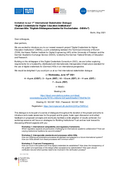 Invitation Documents incl. Final Agenda
Invitation Documents incl. Final Agenda
-
 “Project Presentation Digital Credentials for Higher Education Institutions”, Hans Pongratz & Matthias Gottlieb
“Project Presentation Digital Credentials for Higher Education Institutions”, Hans Pongratz & Matthias Gottlieb
-
 “Keynote - Digital Credentials: International Collaboration & Interoperable Standards”, Kim Hamilton & Philipp Schmidt
“Keynote - Digital Credentials: International Collaboration & Interoperable Standards”, Kim Hamilton & Philipp Schmidt
-
 “Mentimeter Slides”
“Mentimeter Slides”
-
 “Miro Boards from Workshops”
“Miro Boards from Workshops”
Project Launch
Stakeholder-Dialogue and Kick-off at 4th of May 2021
Our virtual meeting with over 45 participants from similar projects and initiatives in Germany kicked off the joint activities with our stakeholders. Peter Hassenbach (Head of the Project Group "Nationaler Digitaler Bildungsraum - National Digital Educaction Space” at the German Federal Ministry of Education and Research) positioned DiBiHo as part of the lifelong Student Journey and addressed the relevance of Digital Credentials in the context of the German government initiative to create a Nation Digital Education Platform. Katrin Hauenschild (lead of the OZG Subject Education, Ministry of Finance of the State of Saxony-Anhalt) reported on her experiences of OZG implementation in the education sector, pointing out the challenges of federal education structures and raising questions about the longevity of digital certificates.
A general introduction to the joint project was given by Dr. Hans Pongratz (Senior Vice President for IT Systems & Services, CIO, Technical University of Munich), Alexander Knoth (Chief Digital Officer, German Academic Exchange Service) pointed out that the recognition of academic certificates still poses an obstacle to international exchange. For this reason and against the backdrop of international student data mobility, the DAAD has a particular interest in finding interoperable technical approaches, he concluded. Prof. Dr. Christoph Meinel (Director and CEO of the Hasso Plattner Institute for Digital Engineering) reported on openHPI with its over 950,000 enrollments, arguing that the platform points to a need among users for lifelong learning and hybrid learning formats, and that this need could be met in with digital credentials in future.
A very similar approach was taken by Adj. Prof. Dr. Dominic Orr (University of Nova Gorica & Management atingi digital learning platform) in his keynote on the relevance of micro-credentials for international cooperation. He explained that the cumulative and systemic collection of skills and expertise in a person's profile as well as recognition between systems is an important step towards inclusive higher education.
In the subsequent workshop, the participant identified future user groups and mapped these to a technical stakeholder model as well as anticipating future challenges for the project. Stakeholders were particularly interested in the topics of interoperability, learner self-sovereignty, networking, and infrastructure integrity, and expressed a desire for more exchange amongst each other, which we will be happy to accommodate in future.
Past Meet Ups with DiBiHo
- 8. Zukunftskongress "Staat & Verwaltung"
20.-22.06.2022 Berlin (To Event website) - Global Engineering Deans Coucil (GEDC)
Vortrag zum Thema "Dealing with Digital Credentials in Higher Education Institutions and their Potential"
08.06.2022, 3 p.m. - 4 p.m. CEST, Online - "Digitization of (Higher) Education Processes: Innovations, Security and Standards"
01.-03.06.2022, EUNIS 2022, Göttingen (To Event website) - 8. Digital Credentials Regulars
07.06.2022, 5 p.m. - 6 p.m. CEST, Online - EUNIS 2022 Annual Congress
31.05.-03.06.2022, Göttingen (To Event website) - "Digital Credentials for Higher Education Institutions"
27.05.2022, European Reform University Alliance (ERUA) Digital Escape Meeting - 7th edition: Digital Credentials Regulars
17.05.2022, 5 pm - 6 pm CEST, Online - 16. Tagung der DFN-Nutzergruppe Hochschulverwaltung
Talk on the topic "Digitale Bildungsnachweise im Kontext von Blockchains"
09.-11.05.2022, Wismar (To Event website) - 2nd International Stakeholder Dialogue
4.5.2022, 3 - 5 pm (CEST), Register: https://www.daad.de/surveys/661536?lang=en - PESC April 2022 Data Summit
Talk on the topic "Overview of European Standards for Digital Credentials in Higher Education Institutions"
25.-27.04.2022, Washington, D.C. (To Event website) - 6th edition: Digital Credentials Regulars
21.04.2022, 5 pm - 6 pm CEST, Online - DCC and MIT
08.-24.04.2022, MIT, Boston, MA - Chillenium Game Jam 2022
01.-03.04.2022, College Station, Texas (Zur Veranstaltungs-Webseite) - CampusSource Tagung 2022
17.03.2022, 10 am - 4:30 pm CEST, Online (To Event website) - 5th edition: Digital Credentials Regulars
16.03.2022, 4:30 pm - 5:30 pm CEST, Online - 4th edition: Digital Credentials Regulars
16.02.2022, 5 pm - 6 pm CEST, Online - CertiDigital, Kickoff
13.01.2022, 1 pm - 1:20 pm CEST, Online (To Event website) - 3rd edition: Digital Credentials Regulars
15.12.2021, 5 pm - 6 pm CEST, Online - Talk on the topic "Herausforderungen bei der Umsetzung Digitaler Bildungsnachweise im Hochschulbereich"
openHPI Forum, 24.11.2022, Potsdam (in German, to contribution) - Special Session: CETEE COVID-19: Emerging Topics in Engineering Education
15.-18.11.2021, Madrid, Spain, (To Event website) - Panel discussion on the topic “Cultural Diplomacy: Global Perspectives on Digital Transition”;
Talk on the topic "Exploring a Digital Credentials Infrastructure with Self-Sovereign Identity in Mind";
Talk on the topic "GERMANY: Towards a Digital Education Space of Collaboration"
Groningen Declaration Network Annual Meeting, (To the event website), 10.-12.11.2021 - Workshop on the Topic Self Sovereign Identity in Higher Education: To be or not to be digital (in German, to contribution)
Meet the Authors: "Digitalisierung in Studium und Lehre gemeinsam gestalten" (Springer VS, 2021, to contribution)
University Future Festival, 04.11.2021 - 9:45 - 10:45 CEST; 12:00 - 13:00 CEST - EDUCAUSE Annual Conference 2021
26. - 29.10.2021, Philadelphia, PA & Online (To the event website) - PESC - Data Summit 2021
19. - 21.10.2021, Online (Zur Veranstaltungs-Webseite) - ICL 2021: Special Session Games in Engineering Education (GinEE)
22. - 24.09.2021, 24th International Conference on Interactive Collaborative Learning (ICL) 2021, 50th IGIP International Conference on Engineering Pedagogy 2021, Dresden & Online (Zur Veranstaltungs-Webseite) - GEDC Industry Forum 2021
20. - 22.09.2021 Dresden & Online (Zur Veranstaltungs-Webseite) - "Adoption of E-Government Requirements to Higher Education Institutions Regarding the Digital Transformation"
09.00 - 10.30, 08.09.2021, EGOV-CeDEM-ePart 2021 (Zur Veranstaltungs-Webseite) - Digitale Bildungsnachweise im internationalen Kontext: Das Verbundprojekt „Digitale Bildungsnachweise für Hochschulen“ (Technische Universität München, HPI Potsdam, DAAD)
10:05 - 11:00, 07.07.2021 HRK-Modus (Zur Veranstaltungs-Webseite) - Special Session: Games in Engineering Education (GinEE)
Special Session: Challenges in Remote Learning for Engineering and Computer Science Education Caused by the COVID-19 Crisis: Methods and its Applications in Lectures, Labs, Tutorials, and Assessments
21.-23.04.2021, 12. IEEE Global Engineering Education Conference (EDUCON) 2021 (Zur Veranstaltungs-Webseite) - Digital Credentials in Higher Education Institutions: A Literature Review
09. - 11.03.2021, Internationale Tagung der Wirtschaftsinformatik (WI) 2021 (Zur Veranstaltungs-Webseite)

